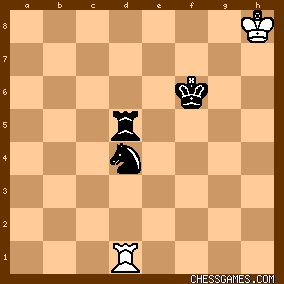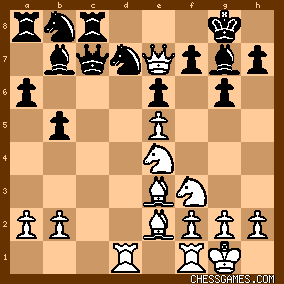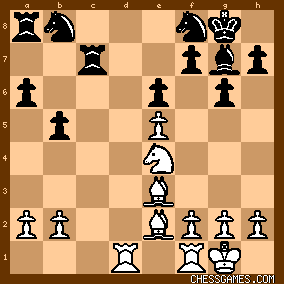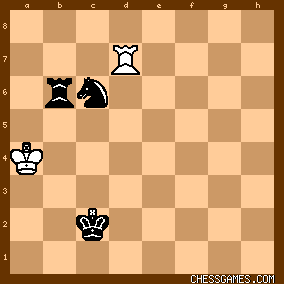|
< Earlier Kibitzing · PAGE 2 OF 2 ·
Later Kibitzing> |
| Jul-26-08 | | messachess: What a treat this game is to study: a great game and teaches you how win with K,R,N vs. K,R--great. |
|
| Jul-26-08 | | TheBB: <maxfrank> There are no exceptions any more. |
|
| Jul-26-08 | | cade: <And Dominguez still had 2 more moves to spare out of the 50 alotted> Actually he had 12 moves left since Black took a White pawn on move 53. |
|
| Jul-26-08 | | 4tmac: 
click for larger view This is from the famous Polgar-Kasparov 1996 game. The only move to draw(!) was R-f1+. White needed to keep the Rook on this side to draw but it seems to me (like I know) she was not sure of the long side and played R-a1?! The Rook got stuck on the a-file instead of the 1st-rank and she lost. This ending isn't as difficult as the R+B vs. R but I'm starting to think it's close. |
|
Jul-26-08
 | | kamalakanta: Any ranking points Lenier gets from this one are well deserved, I say! |
|
| Jul-26-08 | | Alphastar: A future tuesday level position after 88. Rd7. |
|
| Jul-27-08 | | Zonszein: Capablanca was world champion at 33.
Dominguez is only 25, mmmm.
|
|
| Jul-27-08 | | Gilmoy: Interesting dynamic at 33.g4 -- White is stuck on K-side with no real threats, while Black's Rc6 is paralyzing the entire Q-side. 34..Ng6! is a boggling long-range threat on Black's b2-pawn, and White can't untangle his pieces to defend it. Note that Kf1/Rg2 isn't enough, as Black still has Nxa3 overworking b2. |
|
| Jul-27-08 | | znprdx: How important is it "to play out a game of Chess to its very end"? That is like asking to distinguish/ differentiate the athletic merits of a sprinter vs. a marathoner. Well as one who lost more of my 'won games' than I care to recall - I guess I'm not well suited to argue against this..... However there is something sadly cheap and hollow about such an absurd victory. It reduces to the equally cheap 'touch piece' rule or winning a game on time without increments. Given that the 50-move rule is itself rather arbitrary the issue reduces to RESPECT for one's opponent - especially at this level – which is the normal standard. Playing on yesterday past the time control at move 40 was bad for Chess because there was ONLY the possibility of a blunder which could decide the game. There was next to no value playing it out. I am curious as to whether or not L D-P refused a draw offer... On the other hand we must not overlook the tenacity Carlsen has shown by playing out a couple of Bishops of opposite color positions ...which had some fine points worthy of the effort. Worse I suppose was to leave the world hanging like in Kramnik-Anand
After 41.Ra8+ FIDE World Championship Tournament 2007 (game 37 chessgames.com) But as I posted then: “Perhaps even at the highest levels of competition when the choice tree suddenly seems to paradoxically expand rather than contract, opting for a draw can in fact be honorable in the face of increasing risk.” |
|
| Jul-27-08 | | madlydeeply: Odd debate. it is "bad" for chess because Dominguez played it out. a blunder on move 88 has "marred" the entire Biel tournament and all the tournament praxis in the history of sport. I suppose it is a debate between those who wish to see perfection in chess and those who wish to see competition in chess. Well good luck on your quest for perfection, Chess Scientists! Turn a sour face on every game that has a flaw! (meaning EVERY game of chess...) Demean any player that dares claim a win, marring those perfect draws that we all long to see! Chess should be a realm of politeness, so we should definitely exclude the fighters and brawlers...like Tal, Fischer, SuperNezh! Such squalid hacks who deem it necessary to pressure their opponents with sloppy complications in hopes of a blunder...Bah. Maybe you are too good for chess, Chess Scientist! Maybe Chess is too crass a game! A game for the hoi polloi! |
|
Jul-27-08
 | | chancho: Onischuk had to prove he had the necessary endgame technique to draw this ending, and he failed to do so. Congrats to Dominguez, who was very determined, and was duly rewarded for his effort. The one positive from this for Onischuk, is that he wont fall into the same mistake, (should he play this ending again in the near future) as he no doubt learned a great deal from this game. And quite frankly, it's good to know that these top players are still finding that they don't know everything about the royal game, and can still aspire to improve themselves even further. |
|
| Jul-27-08 | | s4life: <znprdx: However there is something sadly cheap and hollow about such an absurd victory.> Why play chess at all then? as some suggest with perfect play, the game will end up a draw or at least white cannot lose. To continue playing from
the initial position is to be disrespectful to either player. |
|
| Jul-27-08 | | Alphastar: <However there is something sadly cheap and hollow about such an absurd victory. It reduces to the equally cheap 'touch piece' rule or winning a game on time without increments. Given that the 50-move rule is itself rather arbitrary the issue reduces to RESPECT for one's opponent - especially at this level – which is the normal standard.> Why? If you're on the defensive and you can only hope to draw the game in endgames like these, it is up to you to prove it's drawn. Lenier Dominguez could play for a win without any risk whatsoever. Onischuk blundered at the end so he didn't deserve the draw. This has nothing to do with 'respect'; there are similar endgames which are drawn with perfect play but where the defence is quite hard so the superior side has everything to gain by playing on. Such as the rook vs knight endgame. Also, what is 'cheap' about the 'touch piece' rule or winning a game on time without increments? The former simply exists to keep players from constantly fiddling with the pieces, and the latter is simply bad time managment by the losing side. Both players agree with the time-controls beforehand (or they wouldn't be playing in the first place) so it makes no sense to say that losing on time is 'cheap'. |
|
| Jul-27-08 | | madlydeeply: I hope this game shows that Dominguez-Perez has ambition to go to the top...He certainly has the fighting spirit! |
|
Jul-27-08
 | | kamalakanta: <znprdx: However there is something sadly cheap and hollow about such an absurd victory.> <Playing on yesterday past the time control at move 40 was bad for Chess because there was ONLY the possibility of a blunder which could decide the game. There was next to no value playing it out. I am curious as to whether or not L D-P refused a draw offer...> I could not disagree more with you. Playing beyond the 40-move time control yesterday was GOOD for chess, because, you know what? there was no adjourment and no computer to help either player. I doubt that ANY of us could have drawn this endgame. Sure, looking it up in a book or a computer, it is so easy to judge Onischuk..."what a blunder!", etc. We have become great "armchair athletes", able to criticize the best grandmasters if they don't measure up to the "tablebases" perfection. But this is PEOPLE playing chess, not computers.
I played at the Capablanca Memorial in 1977. I had a very bad tournament. For personal reasons, my chess could not happen at its best level. After playing disastrously for the first few rounds, I faced a Colombian IM. I was losing, but found a way to steer the game into a R+B against R ending. I drew the ending, and the Colombian IM was complaining "why did you have to learn to play chess now?" since he had seen my previous games. I give all credit to Leinier for executing the winning plan. Technically, it is not so easy to play this ending for either side! Black had to find the precise moves! I enjoyed paying through the ending, seeing Leinier's technique. It is excellent, and leaves a good impression. Another benefit is that hopefully we all learned something from this ending (and I am NOT talking about agreeing with the computer on which was the losing move). How many won games are won, or even lost? How many lost games are drawn, or even won? Any game of chess is not over until the very end. If it is drawn, show me: show me your technique. Otherwise, lose the game, sign the scoresheet and learn. All the great champions of our game were great endgame players. And they all knew how to save lost games, win "drawn" endings, etc. So, with due respect, I could not disagree with you more. |
|
| Jul-27-08 | | littlefermat: <Onischuk had to prove he had the necessary endgame technique to draw this ending, and he failed to do so....> He probably knew what to do, but I think most guys would be too exhausted to play on in a theoretically drawn position. His 88 Rd7 wasn't some small error but a total howler. Crude blunders like that occur when your concentration snaps from fatigue (at least this is what happens to me). I do feel bad for Onischuk though. Losing stinks, and to lose in such a way... |
|
| Jul-28-08 | | PinnedPiece: <madlydeeply:>
Good post on Chess in the Real World. Vaults you to the top tier phiosophers on this website, IMHO. Now if your politics could be as realistic (which I see they aren't by your advertised favorite authors).... |
|
| Jul-28-08 | | PinnedPiece: <zprdnx" However there is something sadly cheap and hollow about such an absurd victory. > Do you play chess? Mya you feel this way against your next opponent who is way better than you and who loses to you. |
|
| Jul-28-08 | | ralplavner: I live in Cuba. Our national hero Jose Marti once said: " The sun has spots and light. Ungratefull people only talks about spots but the gratefull ones talks about the light" I ask: Why to minimize the victory of Leinier against Onischuk? ? 50 moves rules, time rules, fatigue, errors are equal for both player. Onischuk made a mistake... sorry for him, leinier didn't make it. Onischuk was in a "time hurry" well sorry for him ... for me this victory of leinier proves tenacity, courage, fight spirit... he deserved the victory and he showed us, and show to the world of chess that anyone, anyone, could make a mistake, and if you have the patience to wait u can win!! if u tell me that onischuk made one mistake after the other i will shut up inmediatly... but its not the case... leinier made "some" mistakes during the game... but not in the final! It's a victory sorry for the Onischuk fans... but it's a victory and most of all it's a "how to play" a Rook vs Rook and Knight final. Also u have to remember that Leinier didn't fail with the Carlsen's innovation and also he has introduces two "novité" in this tournement. So u have to recognize HE'S ONE OF THE MOST AT THIS MOMENT. |
|
| Jul-28-08 | | visayanbraindoctor: <However there is something sadly cheap and hollow about such an absurd victory.> On the part of Dominguez, IMO it was not a hollow victory. GM Dominguez was persistent and it paid off. He also played well. Notice how he repeatedly and efficiently used his Knight as cover to protect his King from checks by White's Rook, at the same time limiting the movements of the White King as he slowly drove it to the edge of the board. It takes a lot of brainpower to do that. Finally he attained a position in which White could blunder the way he did (going for a cheap pin instead of keeping his Rook on the c file to prevent the approach of the Black King); and White did. But in the first place Dominguez could not have obtained such a position if he just aimlessly shuffled his pieces around. GM Onischuk on the other hand certainly knew how to draw this ending. He tried to keep his King as far away from the edge of the board as long as he could; and kept his Rook ready for pins on the Black Knight and checks on the Black King. Without his blunder, he would have been able to claim the draw in a dozen more moves (50 move rule). He was just human and erred, after working so long to keep his King away from the edge of the board. Psychologically Onischuk probably got used to the technique that he was using of trying to pin the Black Knight; and fatigue caused him to overlook that on his last pinning move 88. Rd7, Dominguez could just leave his pinned Knight because his next move 88...Kc2 threatens mate. The following is a post I made in the Biel Tournament corner. <visayanbraindoctor: I am staring agog at 88. Rd7. By just staying his rook on the c file, White would have prevented the Black King from approaching his own. Maybe this is the answer:acirce: Been playing for more than 6.5 hours though. The fatigue factor is another thing that's easy to underestimate..> We all are just human and we all make blunders.. |
|
| Jul-28-08 | | norami: What is the time control at this tournament? |
|
| Jul-28-08 | | Pjalle: This kind of win will always be surrounded with a bit of controversy, some people think it's not good sportsmanship to continue playing a theoretically drawn endgame hoping for the opponent to blunder. Well, guess what, chess is about winning and ultimately a win often comes as a result of the opponent blundering, whether it's in the opening, midgame or endgame. The good GMs are actively trying to make their opponent blunder, like Carlsens technique of seeking complicated positions. Lenier was testing Onichuks endgame skills and Onichuk failed, it's as good a win as any other. |
|
| Jul-28-08 | | amaurobius: Fascinating ending.
According to Keres' (generally excellent) book on endings K, R & N vs K & R is usually a draw "because the king cannot be driven to the edge of the board". Can someone enlighten me whether Onischuk played weakly even before his losing blunder - or has technique moved on since Keres' day? |
|
| Jul-28-08 | | whiteshark: Maybe <17.Ne4> is worth a deeper look. 
click for larger view e.g. <17...Bxe4 18.Ng5 Nf8 19.Qxc7 Rxc7 20.Nxe4> 
click for larger view and now <20...Bxe5?> will lose due to 21.Rd8!  . So maybe it's better to proceed <20...Nc6>, but than <21.f4> protects ♙e5.<21...Nb4 22.Bf3 Nd5 23.Bd4> I think White is having a small surplus due to his better minor piece activity. . So maybe it's better to proceed <20...Nc6>, but than <21.f4> protects ♙e5.<21...Nb4 22.Bf3 Nd5 23.Bd4> I think White is having a small surplus due to his better minor piece activity. |
|
Sep-07-11
 | | Peligroso Patzer: <Peligroso Patzer: BTW, at moves 88-90, Dominguez found three consecutive "only" winning moves.> <drmariogodrob: <Peligroso> If it were me--and I grant that I'm not terribly bright--I'd say that 90. [...] Kc3 seems to win also.> In this position (after <90. Ka3-a4>):

click for larger viewif Black plays the suggested <90. … Kc3>, White now has four moves that draw (according to the tablebase: http://www.shredderchess.com/online...). One drawing move is: <91. Rd1>, and if <91. … Kc2> then there are six (6) drawing moves, including two moves along the file (<92. Rd5> or <92. Rd6>, which prevent the winning idea Dominguez used in the actual game at moves 90 and 91, i.e., <90. … Rb4+> followed by <91. … Rb5> threatening <92. … Ra5#>, which White can delay only by sacrificing his rook). In the above variation, of course, after <91. ... Kc2>, White must AVOID <92. Rd7?>, which returns to the position from the game after White's 90th and loses to <92. ... Rb4+> and <93. ... Rb5>, again threatening mate that cannot be forestalled without loss of the White rook. |
|
 |
|
< Earlier Kibitzing · PAGE 2 OF 2 ·
Later Kibitzing> |





